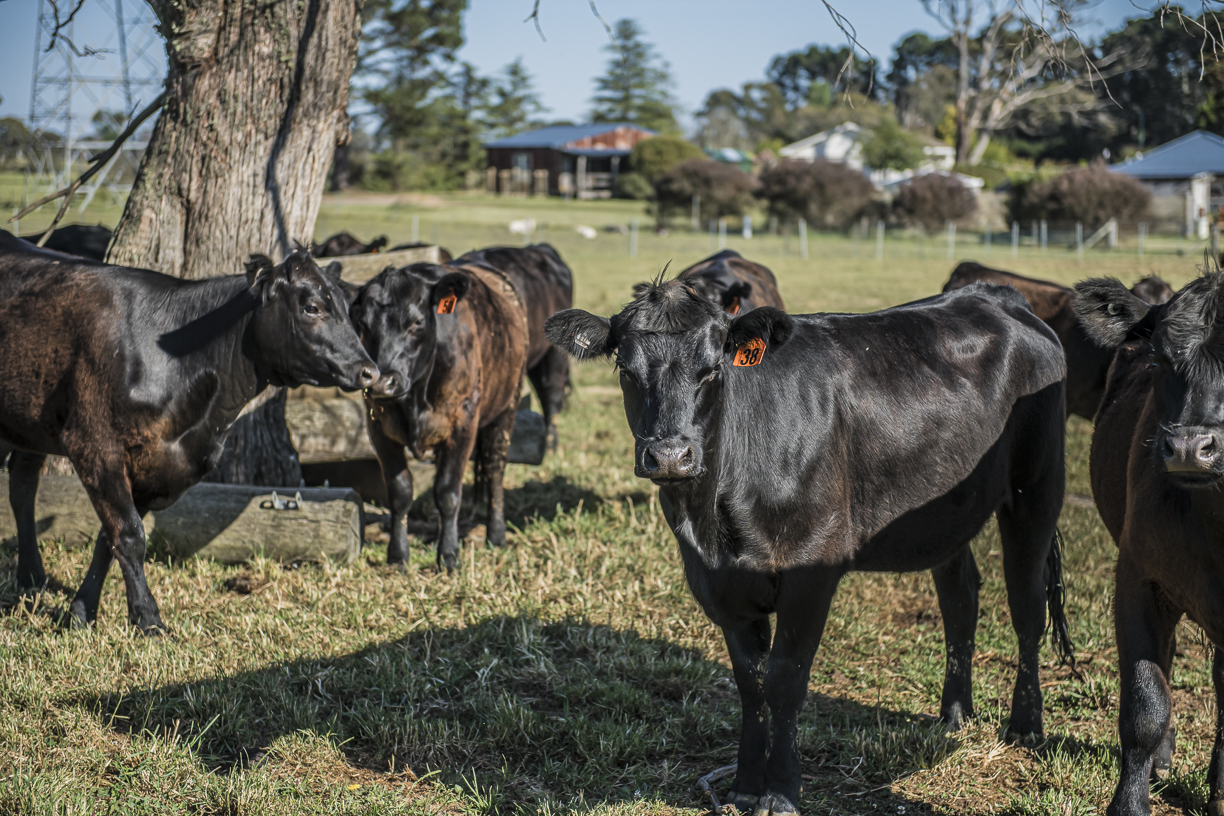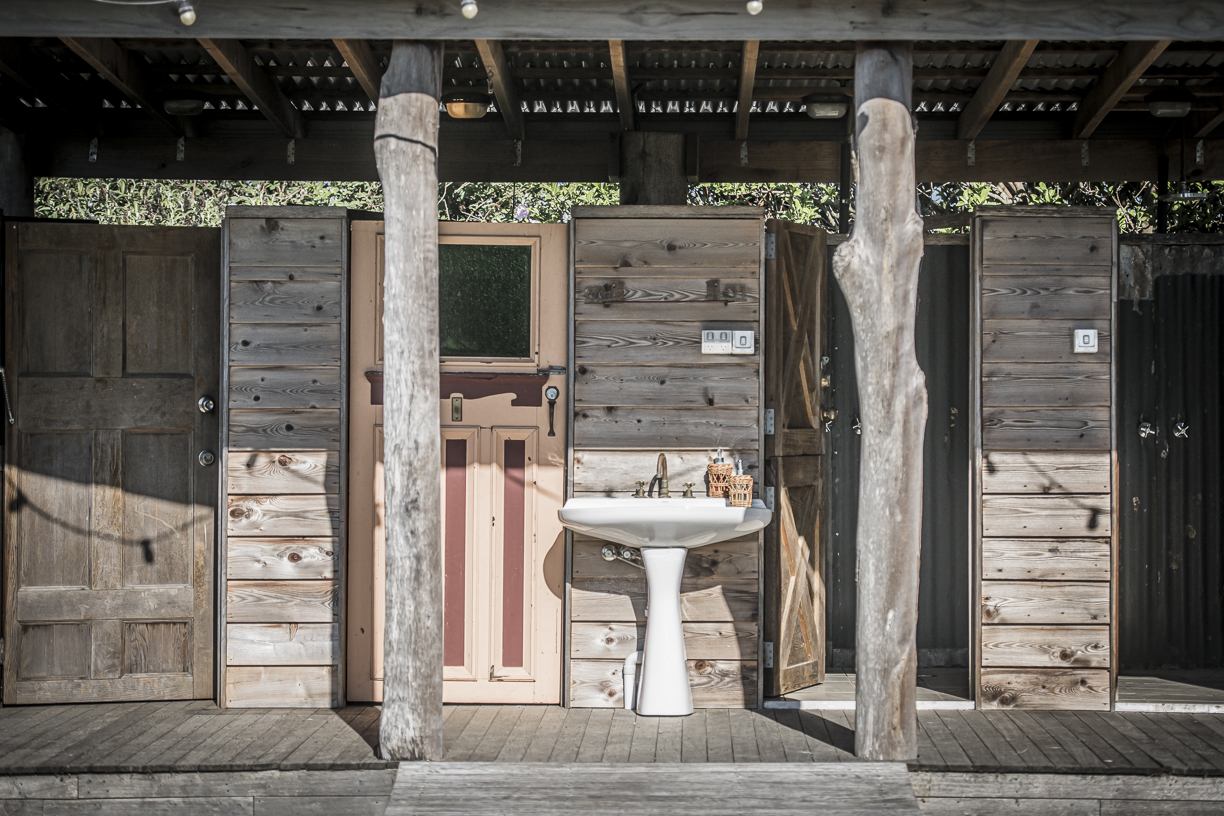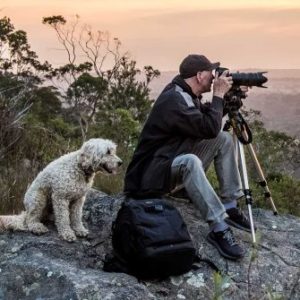Snake Creek Cattle Company
Words: Michael Sharp.
Photography: Ashley Mackevicius.
On a warm Spring morning, industry legend Phil Webb is conducting a clinic in horsemanship under a bright blue Southern Highlands sky. Behind the arena, a mob of young black cows is grazing contentedly in a grassy paddock. In the afternoon the mob will be moved on horseback by the clinic class, implementing the mustering skills they have been refining during the day. Meanwhile, on the other side of the paddock, locals and tourists are enjoying coffee, scones with jam and cream, fruit crumble pies, bacon and egg rolls, sausage rolls and meat pies at the farm gate café.
It’s just another busy day for Hugh, Alice and their team at Snake Creek Cattle Company in Werai, a small community located between Moss Vale and the village of Exeter.
“You couldn’t script it,” says Alice. “It has been an evolution, but there aren’t too many surprises to us about where the business is today.”


Snake Creek Cattle Company
Hugh and Alice breed their cattle in The Southern Highlands.
“We produce well marbled F1 Wagyu, which means Wagyu bulls over Angus cows. The calves are then taken to Mandurama [between Cowra and Bathurst] which is very good finishing country and they are pasture-raised and finished. They go through the abattoir in Cowra and are then brought back to the on-farm butchery here in Werai where we make all our steaks, hamburger patties, sausages and gourmet pies. We pride ourself on producing pasture to plate beef with no added hormones, antibiotics or artificial ingredients.”
Hugh is a large man, and he wears a large hat, however he recognises that size isn’t everything.
“Our objective is not to grow something big, because big is not always best. People today are super-interested in where their food comes from, the whole supply chain, and they really appreciate quality. Because we are small we can maintain a high quality approach to everything we do and offer it at a reasonable price. Importantly, because we are a farm-direct-to-customer business, our customers can visit us and see exactly where their produce comes from. When they come in, we know who they are, what they want and we can look after them. It sounds a bit old school but it still works.”
The large, glass door fridge in the farm gate café offers an enticing range of Snake Creek beef cuts including Scotch Fillet, Sirloin, T-bone, Ribs and Brisket as well as sausages and mince. And then there are the home-made pies: Wagyu beef, beef ale and mushroom, Moroccan beef tagine, Massaman beef with cashews as well as vegetarian options such as mushroom and leek.
Most of their customers are Southern Highlands locals while they also supply steaks, burger patties and pies to two Sydney pubs owned by Hugh and Alice – the Imperial Hotel, Paddington and the newly renovated Resch House in the Sydney CBD – as well as the Royal Hotel Mandurama, known colloquially as The Mando Pub.







Horsemanship
Snake Creek’s ethical approach to its beef business extends to only using horses, and not loud machines such as motorcycles or helicopters, to move their herds.
“We do all of our mustering on horseback, the old school way, because we believe in quieter livestock practices.”
Hugh and Alice are keen to ensure these traditional skills survive and Snake Creek offers a range of on-site, educational horsemanship clinics and programs.
“We bring trainers in, mostly western-style cow horse sports including cutting and reining, and we limit each program to about a dozen participants. Again, big isn’t best, so we keep the group at about that number.”
The clinics are conducted in the Ranch Arena, which is 60 metres by 40 metres and has covered stands on two sides. “Fence sitters” are welcome to come along, watch, listen and learn.
Most of those attending the clinics stay on the Werai property, camping or taking advantage of the rustic accommodation. They enjoy dinner under the stars which features a fireside feast with produce supplied from the farm.
“It’s not just about horsemanship, it’s the country hospitality as well,” says Hugh.
The horsemanship clinics are part of a broader focus on the Southern Highlands equine industry for Hugh and Alice.
“It passes under the radar a bit, but there are a lot of fantastic operators and we are keen to foster and support it wherever we can.”





Education and community
Hugh and Alice’s support for education and training extends beyond the equine industry.
“We recognise that it’s really important to keep pathways into employment and to help local people get training and get good jobs in the area if they want to stay here – because there is certainly no shortage of work,” says Alice.
“This includes our agri-entrepeneurship program which involves more mature schoolkids coming to stay with us for a few days. They get to see the agricultural side of the business, including our direct-to-customer programs, and the hospitality side, including sales and marketing. It’s been really successful and we’ve had great responses from the schools involved.”
Hugh and Alice also allow community groups to take advantage of infrastructure on the property, particularly The Saddler’s Shed, which is “unofficially the Werai Town Hall”.
“It’s an easy place for local groups to have their gatherings. A mothers’ group meets here, we’ve had photography groups and artists in residence and the local pipe band didn’t have anywhere to go so they come and practise here – and the cattle love the bagpipes!
“The local community are the ones who truly support us and it’s part of who we are.”

When Hugh met Alice
Hugh grew up around Bungendore and then the Central West of New South Wales “but like a lot of country kids I couldn’t wait to get away from the bush and I travelled overseas for quite a few years. When I came back to Australia I set up a business which involved taking over any pub that no one else wanted to run. That ended up being quite a lot of pubs because the industry was facing a lot of challenges. We didn’t have a lot of experience but we had a lot of energy. Over time we expanded into other hospitality businesses and then further broadened our skill set to provide consultancy services to museums, childcare centres and any business that needed a turnaround.
“We transitioned from RM Williams boots into pinstripe suits.”
It was a successful business but also a very busy one. One day, Hugh realised he had come full circle.
“From a young man who couldn’t wait to get away from the bush, I realised all I really wanted to be was a cowboy. So Alice and I started working our way back down to The Southern Highlands, where Alice’s family had a property.”
Alice grew up in Jersey in the Channel Islands, however she has had a life-long connection with Australia: “My mother [a descendant of the Resch brewing family] was born in Sydney, my grandfather was born in Wilcannia, my grandmother was born in Casino and my great grandmother was born in Toongabbie. I have had an Australian passport and been an Australian citizen all my life.”
Hugh and Alice met in a boardroom 25 years ago when Hugh was brought in to resolve “a spot of bother. We got on pretty well and ended up making a life together.”
“We’ve run projects together pretty much since that day,” says Alice.
Drought, bushfires and COVID
The Werai Tea House, a local institution run by a husband and wife for many years, operated from the property next door to Hugh and Alice. When the husband died about a decade ago, Hugh and Alice acquired the property and continued to run the business with its edible garden and nursery. They expanded the offering, including farm tours and accommodation, and changed the name to Farm Club.
“We were early adopters in that agritourism space and it was very popular,” says Hugh.
But then, like so many others, they were hit hard by the drought of 2018.
“It was very tough and we had to fight hard to maintain our herd. There was no groundwater and at one stage we were trucking in hay from Western Australia.”
They struggled through the drought – and then the bushfires came through.
“The property backs on to National Park and the fires came belting out of there and burnt about 200 acres,” recalls Hugh. “It was an exhausting and difficult time. We had to evacuate horses and all our guests and, thankfully, we didn’t lose any livestock.”
“It was life-changingly frightening,” says Alice.
Just as they were contemplating reopening for business, “COVID rolled in over the top of us”.
It took over a year to put all the various moving parts that make up Snake Creek Cattle Company back in place and the farm gate café finally reopened in April this year.
Hugh and Alice clearly enjoy the challenge and relish the hard work required to build an agribusiness – integrating beef production, horsemanship, hospitality and education – that will make a meaningful, long-term contribution to the Southern Highlands community.
“If we can offer something that is ethical, sustainable, high quality and affordable then that is great for our locals.”
For more information visit www.snakecreekcattlecompany.com



Michael Sharp
Michael has been working at Michael Reid Southern Highlands since it opened in March 2022. He has previously worked as a lawyer, journalist and senior practitioner in Australian corporate affairs.

Ashley Mackevicius
Ashley discovered photography at the age of 15, which proved to be a lifeline for the academically challenged son of Lithuanian migrants. He has had a long and successful career and lives in The Southern Highlands.
- xxi Pecora Dairy June 2024
- xxvii Marlie Draught Horse Stud May 2025
- xxvi India Mark February 2025
- xxv Mussett Holdings December 2024
- xxiv Louise Frith October 2024
- xxiii Dirty Jane August 2024
- xxii Melanie Waugh July 2024
- xx Emily Gordon May 2024
- xix Steve Hogwood March 2024
- xviii Julz Beresford February 2024
- xvii Snake Creek Cattle Company November 2023
- xvi Ben Waters September 2023
- xv The Reid Brothers August 2023
- xiv Elizabeth Beaumont July 2023
- xiii The Charlotte Project June 2023
- xii Buddhism in Bundanoon May 2023
- xi Honey Thief April 2023
- x David Ball February 2023
- ix Kate Vella January 2023
- viii The Truffle Couple December 2022
- vii Wombat Man November 2022
- vi Storybook Alpacas September 2022
- v Tamara Dean August 2022
- iv John Sharp July 2022
- iii Amanda Mackevicius June 2022
- ii Denise Faulkner May 2022
- i Joadja Distillery March 2022













